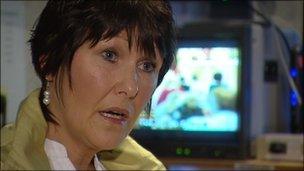Abuse survivors meet Irish Catholic leader Cardinal Brady
- Published

Cardinal Brady welcomes the group in Armagh on Monday
The Northern Ireland Survivors and Victims of Institutional Abuse group (Savia) are meeting Catholic primate Cardinal Sean Brady.
They are seeking guarantees of his total co-operation with the forthcoming abuse inquiry in Northern Ireland.
They want to ensure, via him, "the unconditional co-operation from the orders who ran institutions where children were placed".
The inquiry will consider allegations dating back to 1945.
Margaret McGuckin, of Savia, said she was abused at a Sisters of Nazareth orphanage in Belfast from the age of three.
She said they would be asking Cardinal Brady to apply pressure on religious orders to co-operate.
"This has been a long and tortuous route for some survivors and victims, re-awakening and reliving memories that were nightmares for some," she said.
"We believe that the cardinal holds a key position that will allow that nightmare to end.
"We have been led up the garden path so many times, it was just about story telling."

Margaret McGuckin, of Survivors and Victims of Institutional Abuse, was abused
"We need to know they are going to support and make a commitment. We need follow-up meetings. We need them to admit rather than pushing people like their lawyers in front of us.
"Are they going to be genuine and Christian in their attitude?"
Representatives of five religious orders where institutional abuse is alleged to have happened are also at the meeting which began at about 11:00 GMT on Monday.
Cardinal Brady came out to welcome the group at his private residence in Armagh. At lunch-time, the meeting was still going on.
Savia campaigned for the NI Executive to hold an inquiry into historical institutional abuse. Final preparations for this are being made by the Office of the First and Deputy First Minister.
It is understood that one part of that process will begin in the next few months.
This is where people are given the opportunity to describe what happened to them in private.
However, the second part of the inquiry, the statutory process, involves a change in Northern Ireland's law which will have to pass through the assembly. This will require more time.
The executive inquiry will include Catholic religious orders, state and voluntary groups.
It follows lengthy judicial examinations of horrifying tales of abuse in the Irish Republic.
- Published29 September 2011
- Published21 January 2011